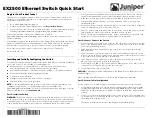
User’s Manual of WGSW-20160HP
302
3. Softphone Voice
4. Video Conferencing
5. Streaming Video
6. Control / Signaling (conditionally support a separate network policy for the media types above)
A large network may support multiple VoIP policies across the entire organization, and different policies per application type.
LLDP-MED allows multiple policies to be advertised per port, each corresponding to a different application type. Different ports
on the same Network Connectivity Device may advertise different sets of policies, based on the authenticated user identity or
port configuration.
It should be noted that LLDP-MED is not intended to run on links other than between Network Connectivity Devices and
Endpoints, and therefore does not need to advertise the multitude of network policies that frequently run on an aggregated link
interior to the LAN.
Object
Description
Delete
Check to delete the policy. It will be deleted during the next save.
Policy ID
ID for the policy. This is auto generated and shall be used when selecting the
polices that shall be mapped to the specific ports.
Application Type
Intended use of the application types:
Voice
- for use by dedicated IP Telephony handsets and other similar appliances
supporting interactive voice services. These devices are typically deployed on a
separate VLAN for ease of deployment and enhanced security by isolation from
data applications.
Voice Signaling (conditional)
- for use in network topologies that require a
different policy for the voice signaling than for the voice media. This application
type should not be advertised if all the same network policies apply as those
advertised in the Voice application policy.
Guest Voice
- support a separate 'limited feature-set' voice service for guest
users and visitors with their own IP Telephony handsets and other similar
appliances supporting interactive voice services.
Guest Voice Signaling (conditional)
- for use in network topologies that require
a different policy for the guest voice signaling than for the guest voice media.
This application type should not be advertised if all the same network policies
apply as those advertised in the Guest Voice application policy.
Softphone Voice
- for use by softphone applications on typical data centric
devices, such as PCs or laptops. This class of endpoints frequently does not
support multiple VLANs, if at all, and are typically configured to use an 'untagged’
VLAN or a single 'tagged’ data specific VLAN. When a network policy is defined
for use with an 'untagged’ VLAN (see Tagged flag below), then the L2 priority
field is ignored and only the DSCP value has relevance.
Video Conferencing
- for use by dedicated Video Conferencing equipment and
















































